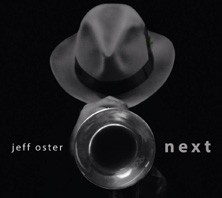 In
2011, Jeff Oster released his album Surrender. With
its mix of ambient / chill-out grooves, that album hit a sweet spot
among fans of modern instrumental sounds. In 2015, Jeff is back with
a new CD, simply entitled next (note correct
spelling on CD cover with lower case “n”). For those who
haven’t yet heard his music, Oster is a master of the
trumpet and flugel horn as well as his use of looping and electronic
percussion. Interestingly, Oster’s music has been described as
Pink Floyd meets Miles Davis, but that would have to be during Floyd’s
most creative Atom Heart Mother era. Even though Oster is primarily
a horn man who composes lush, imaginative, ambient soundscapes, next
can also be considered a guitar lovers dream. Among the fretboard
legends on Next are Nile Rogers, Will Ackerman,
Todd Boston and Carl Weingarten. Instead of making their
presence known with loud soloing, on next, these guitarists
serve to support Oster’s sonic vision, tastefully embellishing
his songs and sound. Also on hand are other music greats such as Tony
Levin (bass), Ricky Kej (keyboards), Bernard Purdie
(drums), Michael Manring (bass) and bass ace Chuck Rainey,
with the latter also penning some additional liner notes. Co-production
by Oster, Will Ackerman and keyboardist Tom Eaton makes next
a first rate sonic experience. As is the case with all his releases,
Next is elegantly packaged, featuring complete information
and a poster too. Fans of 21st century instrumental ambient electronica
meets New Age jazz will find much to admire and appreciate about Jeff
Oster’s latest CD masterpiece. www.Music.JeffOster.com
In
2011, Jeff Oster released his album Surrender. With
its mix of ambient / chill-out grooves, that album hit a sweet spot
among fans of modern instrumental sounds. In 2015, Jeff is back with
a new CD, simply entitled next (note correct
spelling on CD cover with lower case “n”). For those who
haven’t yet heard his music, Oster is a master of the
trumpet and flugel horn as well as his use of looping and electronic
percussion. Interestingly, Oster’s music has been described as
Pink Floyd meets Miles Davis, but that would have to be during Floyd’s
most creative Atom Heart Mother era. Even though Oster is primarily
a horn man who composes lush, imaginative, ambient soundscapes, next
can also be considered a guitar lovers dream. Among the fretboard
legends on Next are Nile Rogers, Will Ackerman,
Todd Boston and Carl Weingarten. Instead of making their
presence known with loud soloing, on next, these guitarists
serve to support Oster’s sonic vision, tastefully embellishing
his songs and sound. Also on hand are other music greats such as Tony
Levin (bass), Ricky Kej (keyboards), Bernard Purdie
(drums), Michael Manring (bass) and bass ace Chuck Rainey,
with the latter also penning some additional liner notes. Co-production
by Oster, Will Ackerman and keyboardist Tom Eaton makes next
a first rate sonic experience. As is the case with all his releases,
Next is elegantly packaged, featuring complete information
and a poster too. Fans of 21st century instrumental ambient electronica
meets New Age jazz will find much to admire and appreciate about Jeff
Oster’s latest CD masterpiece. www.Music.JeffOster.com
mwe3.com presents an interview with
JEFF OSTER
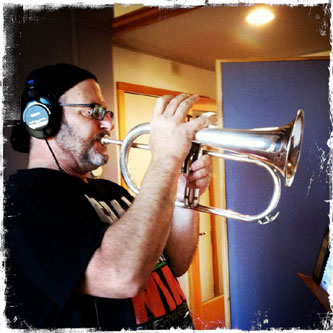 mwe3:
Did you set out to create a superstar session with Next? I
see no less than ten different guitarists alone on here. How challenging
was it to enlist all these great name artists to record with you and
technically, who aided you most during the album recording sessions?
mwe3:
Did you set out to create a superstar session with Next? I
see no less than ten different guitarists alone on here. How challenging
was it to enlist all these great name artists to record with you and
technically, who aided you most during the album recording sessions?
Jeff Oster: I’ve never started a record by making a list
of musicians and then going out to get them to play on the sessions.
It’s a much more organic process, and is influenced quite a bit
the musicians I may be playing with at the time the project begins,
players I have worked with in the past that I feel might add something
now, as well as players that my producers may feel would add something
special -in the case of Next -that’s my co-producers Will
Ackerman and Tom Eaton.
My records almost always begin with just me, alone in my home studio.
After I had begun to do the demos, and a sense of direction began
to emerge, I began to reach out to start to find players that might
add to what I was creating.
I always begin with loops and beats, and then add my horns over the
bed tracks. Once those tracks are fully formed, I’ll choose which
loops I’ll replace with live session artists. I knew that I’d
be working with Will Ackerman and Tom Eaton as my co-producers…
Tom also engineered and mixed all of Next – brilliantly
– in addition to adding many key instrumental performances of
his own. In this case, I started with Bernard Purdie on drums. One
day I just happened to be watching a Steely Dan video on YouTube,
as well as several of Bernard’s live performance videos. The
inspiration came to see if he might want to play on my record. So,
I emailed him, and asked. Shortly thereafter, my phone rang and it
was Bernard. We chatted a bit about the project, and he agreed to
do it. And so it began. Once Bernard agreed to play, why not ask Chuck
Rainey? The two of them, together, have been the heartbeat of some
of the greatest hits, ever! Chuck said yes. Then as I found a studio
to record Chuck and Bernard - Jankland Recording in New Jersey, owned
and run by Steve Jankowski - it turned out that Steve has worked as
Nile Rodger’s music director, and he made that connection.
 And, these
are just a few of the players on Next. Will and Tom and I had
done all of the horn tracking at Will’s Imaginary Road Studios
over a six day period in late October 2014. Will and Tom record some
of the best artists on the planet up there in Vermont, and they bring
into that studio some of the greatest musicians to add their colors
to that records Will and Tom produce. A few of them have been on some
of my previous albums – Michael Manring, Taylor Barefoot, Noah
Wilding, Philip Aaberg have all been on my previous albums.
And, these
are just a few of the players on Next. Will and Tom and I had
done all of the horn tracking at Will’s Imaginary Road Studios
over a six day period in late October 2014. Will and Tom record some
of the best artists on the planet up there in Vermont, and they bring
into that studio some of the greatest musicians to add their colors
to that records Will and Tom produce. A few of them have been on some
of my previous albums – Michael Manring, Taylor Barefoot, Noah
Wilding, Philip Aaberg have all been on my previous albums.
Will and Tom have been working quite a bit with bassist Tony Levin,
and as the songs progressed, I knew I really wanted him to add his
signature style to them. I’ve come to know pianist Catherine
Marie Charlton over the past few years, and we worked for months on
a few of the songs on Next. I know a young artist named Britt
Brady, who lives in Eugene Oregon. Britt is a master at loops and
beats, and he contributed the bed tracks to two of the songs, and
adds that young sensibility to those.
I’ve also played quite a bit, both live and on record, with guitarists
Shambhu Vineberg, Carl Weingarten and Todd Boston. I am grateful that
they too joined me on this. When I wanted some vocals on this record,
I knew that Melissa R. Kaplan, who sang on my album True, would
be perfect. And she is. I play with a wonderful young sax player out
here in San Francisco. Jeff Taboloff is destined for greatness, and
I wanted to be one of the first to grab that spark, and have him add
it to one of the tracks.
 And, last
but certainly not least, last year’s New Age Grammy winner Ricky
Kej and his partner in recording and performing, Vanil Viegas, added
their signature sound to the track “Gardens Of Varanasi”.
And, last
but certainly not least, last year’s New Age Grammy winner Ricky
Kej and his partner in recording and performing, Vanil Viegas, added
their signature sound to the track “Gardens Of Varanasi”.
Technically, and soulfully, Will Ackerman and Tom Eaton made this
record what it is. 100 hours of mixing with Tom, Will’s heartfelt
sense of expression producing my horn performances, and their guidance
as all of these different performances came together as one record,
none of what you hear could have happened without them. They are masters
of their craft, and along with Bob Ludwig’s incomparable mastering
of all of this, I am blessed with a record that I will be proud of
for the rest of my life.
mwe3: What did Nile Rogers bring to the title track? How did
the “Next” theme come together? How did Nile influence your
music and what Nile albums or productions are among your favorites?
Jeff Oster: Nile adds, well, Nile... You know his sound from
so many hit records – Chic’s “Freak Out”, “We
Are Family” - yes, he wrote it with Bernard Edwards!, Bowie’s
“Let’s Dance”, and Daft Punk’s “Get Lucky
and Lose Yourself To Dance”, to name a few. Having him as a part
of this record, is sort of like the cherry on top of the sundae.
 As the record
progressed, Tom Eaton suggested that we add guitar to the title track.
He’s worked with a wonderful guitarist named Scott Tarulli, and
Tom wanted him to play on that track. Once that track was done, wonderfully
I might add, I figured, well, why not ask Nile Rodgers to see if he
might add his flavor as well. I asked, and he said yes. Tom really
is the one responsible for the blend of the two of them on that track,
as well as the co-arranger of it. His ears and sensibilities are all
over this track, and the rest of the record, along with Will Ackerman’s
“Together”, I think we’ve created a new genre –
New Age Ambient Funk.
As the record
progressed, Tom Eaton suggested that we add guitar to the title track.
He’s worked with a wonderful guitarist named Scott Tarulli, and
Tom wanted him to play on that track. Once that track was done, wonderfully
I might add, I figured, well, why not ask Nile Rodgers to see if he
might add his flavor as well. I asked, and he said yes. Tom really
is the one responsible for the blend of the two of them on that track,
as well as the co-arranger of it. His ears and sensibilities are all
over this track, and the rest of the record, along with Will Ackerman’s
“Together”, I think we’ve created a new genre –
New Age Ambient Funk.
Next is about rebirth and change for me, both as a musician
and in my life. Before we ever recorded one note, Will, Tom and I
made a decision to make sure that my horn would be front and center.
To be the lead voice, fully heard throughout the record. This too,
is the “next” step in my journey as a performer, to be heard.
Indeed, I have much more to say. Stay tuned!
mwe3: What is it like recording at the world famous Imaginary
Road studios? How did working with Tom Eaton help shape Next
and who was involved in the engineering and mastering of the album?
Jeff Oster: I can't imagine recording my horns anywhere else,
pun intended! Because Will plays such quiet guitar, his microphones
are second to none for recording instrumental music. And, on top of
that, when you add Will's production experience, his ears for melody,
and the engineering expertise of Tom Eaton, that studio creates the
best horn sound on record of any studio I've recorded in. In terms
of working with Tom Eaton, I think it's safe to say that this record
would not have been possible without him. In addition to engineering,
some arranging and co-producing my horn performances, he mixed the
entire album. There was much that occurred during those mixing sessions
that made this record all of what it is.
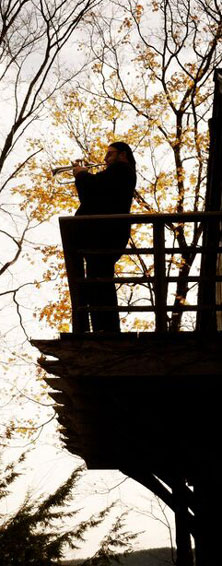 Not
only is Tom a wonderful engineer, he is an incredibly accomplished
musician. There was much music performed and recorded during those
mixing sessions, by Tom, that added to and completed many of the songs
on Next.
Not
only is Tom a wonderful engineer, he is an incredibly accomplished
musician. There was much music performed and recorded during those
mixing sessions, by Tom, that added to and completed many of the songs
on Next.
Bob Ludwig at Gateway Mastering was the mastering engineer on
" Next and that was sort of the icing on the cake. There
is a secret sauce to mastering, and Bob Ludwig certainly has that
recipe!
mwe3: Did you set out with a specific vision of what you wanted
Next to sound like and how would you compare Next with
your 2011 album Surrender? You’ve still got that Soho
after midnight thing going on again with Next. Is Next less
live and more composed compared to Surrender? How do you strike
that balance between a studio and live sound?
Jeff Oster: I can't say that I start out on a project with
a particular end result in mind. It sort of emerges as the songs get
written and performances happen. I do know that Will, Tom and I wanted
to have my horn be heard on top of the mixes, and indeed we succeeded.
Compared to Surrender, there is much more composed performance
on this album. I started overdubs with Bernard Purdie and Chuck Rainey
on drums and bass, in addition to my horn playing obviously, and we
added musicians from there. That being said, every song except one
on Next was written and arranged before I went into the studio,
at least in terms of the horn arrangements. This was the opposite
of the way Surrender was recorded, where Bryan Carrigan and
I would start the day with an idea, and build a song from there. Much
more "live" in that respect.
And as far as that Soho vibe is concerned, it must be in my blood.
I feel a deep connection to that part of New York City, and somehow
I think it shows.
mwe3: What’s new in the trumpet world? Why don’t
you think trumpet players today get the same respect as giants like
Herb Albert and Al Hirt, to name a couple, did way back in the 1960s?
How about in classical music? Don’t you find the trumpet to be
overlooked in orchestral music? (aside from “Revile” and
“Taps”) Who were the greats classical trumpet players? It’s
also big in Mariachi music and it’s also coming back in surf
music!
Jeff Oster: I think that popular music in general has changed
quite a bit since the 1960s and 70s. Herb Albert, Al Hirt, Blood Sweat
and Tears, Chicago, all of those acts either featured horn or had
lots of horns in them, and they were releasing hits!
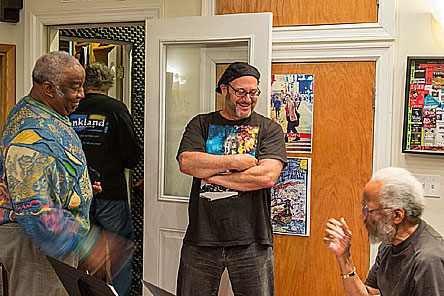 Today's
mainstream music, unless it features sampled horns, doesn't use trumpet
as the lead instrumental voice, except for maybe Chris Botti in the
popular music world. There are, in fact, some pretty great trumpet
players working today, Terence Blanchard and Wynton Marsalis obviously
come to mind. Wynton especially, crosses over to classical as well.
In most cases, however, straight ahead jazz is not going to be as
popular as Taylor Swift. So, it's unlikely for us to hear on a widespread
popular basis of lots of trumpet players like there used to be back
in the day. I, of course, I am doing everything I can to change that!
Today's
mainstream music, unless it features sampled horns, doesn't use trumpet
as the lead instrumental voice, except for maybe Chris Botti in the
popular music world. There are, in fact, some pretty great trumpet
players working today, Terence Blanchard and Wynton Marsalis obviously
come to mind. Wynton especially, crosses over to classical as well.
In most cases, however, straight ahead jazz is not going to be as
popular as Taylor Swift. So, it's unlikely for us to hear on a widespread
popular basis of lots of trumpet players like there used to be back
in the day. I, of course, I am doing everything I can to change that!
mwe3: I am amazed at the vast output of guitar players you
have featured as guest soloists on Next. Do these guys live
in the same area as you? I know Carl Weingarten is another Boy Area
guitar hero. How’s Carl doing these days?
Jeff Oster: There are quite a few wonderful guitarists on Next
from all over the world! I’m truly grateful to have them join
me. There were a couple of songs that specifically were written with
guitar and flugelhorn in mind – “On Mothers Day” and
“And We Dance”, written with Shambhu Vineberg and Will Ackerman
respectively.
Other than that, as each song progressed, we decided that guitar was
needed on a few of them. In the case of Next, the title track,
Tom Eaton was hearing a guitar part, and asked Scott Tarulli to play.
After we had recorded Scott, I had been thinking of Nile Rodgers for
a long time, wanting him to be a part of this project. It turned out,
that he was willing to play on the song as well, so there you have
it! Tom did a great job of mixing those performances, getting the
best out of both!
Carl Weingarten is the best! I'm really glad he is on this album.
Since Carl and I live in the same city, I do see him much more often
than everyone else, and yes, he's doing great! He's always working
on new music, so expect a new Carl Weingarten album anytime now!
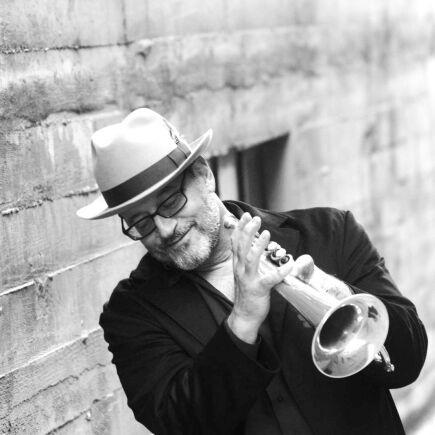 mwe3:
One of the Next highlights is your tribute to your mother Phyllis,
called “On Mother’s Day”. Music is usually the thing
we remember most about our mothers. What was it like to work with
guitarist Shambhu?
mwe3:
One of the Next highlights is your tribute to your mother Phyllis,
called “On Mother’s Day”. Music is usually the thing
we remember most about our mothers. What was it like to work with
guitarist Shambhu?
Jeff Oster: On Mother's Day was written not so coincidentally
last year, actually on Mother's Day. Shambhu and I wrote that
song during that evening, with Shambhu recording at his home studio
in San Diego, and me in Alameda. As it turned out, a few months later
my mother passed away. So, that song most certainly has special meaning,
and deep emotion as you might imagine. Shambhu would be the perfect
accompanist for a song like that, we co-wrote it together and working
with Shambhu is always full of deep feeling. We recorded Shambhu's
finished guitar part at Todd Boston's studio in Northern California.
The session had been scheduled in advance, for what turned out to
be the day after my mother's funeral. So, I got off plane, went to
the studio, and Todd recorded Shambhu's guitar part on that song.
I can't think of a better way to celebrate my mother's life, and her
support for my music.
mwe3: “Avenue D” is a great Next track with
Todd Boston on guitar. Todd also did some engineering on that track.
What’s it like working with Todd? Are you guys planning any other
recordings?
Jeff Oster: Working with Todd Boston is one of the great joys
of my life. In addition to being a wonderful human being, he is an
amazing guitar player. On top of that, he is an excellent engineer
with a very sweet studio called The Magic Cottage that he and his
incredible wife Andrea run in Northern California. I have always wanted
him to be on one of my albums, and when “Avenue D” appeared,
there was a guitar solo section that I thought Todd would be perfect
for. And, as you can tell by listening, he was!
Todd and I are working on some live performances in the near future,
as well as the possibility of me playing on a project that Todd is
currently producing. I very much look forward to our next music making
moments together.
mwe3: Did you record together at the same time with the other
musicians or were there long distance internet files used? Do you
like to record live or do you enjoy overdubbing lots of sounds in
the studio? Seems unworldly get a sound file from India and put it
on your album! What’s that like?
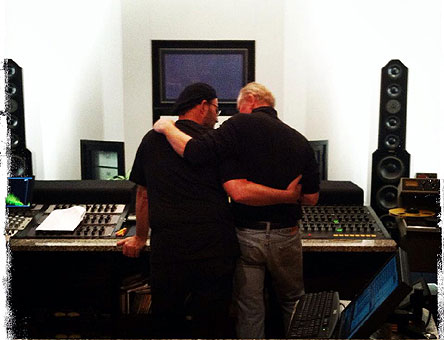 Jeff
Oster: The World Wide Web makes so many things possible. I very
much like recording with the players in the room, like we did with
Bernard Purdie and Chuck Rainey. It was like music fantasy camp, and
I wouldn't trade that experience for anything else in the world. And,
to have artists like Ricky Kej and Vanil Veigas add their music from
India, or Melissa Kaplan add her vocals from her studio in Rhode Island,
those are an amazing addition to the album, ones that would not be
possible without the ability to trade files halfway across the world,
or across the country. There are many of those on Next... Let's
just say that Dropbox made that much easier!
Jeff
Oster: The World Wide Web makes so many things possible. I very
much like recording with the players in the room, like we did with
Bernard Purdie and Chuck Rainey. It was like music fantasy camp, and
I wouldn't trade that experience for anything else in the world. And,
to have artists like Ricky Kej and Vanil Veigas add their music from
India, or Melissa Kaplan add her vocals from her studio in Rhode Island,
those are an amazing addition to the album, ones that would not be
possible without the ability to trade files halfway across the world,
or across the country. There are many of those on Next... Let's
just say that Dropbox made that much easier!
mwe3: Track ten on Next, “The Mystery Of B”
has two bass players, Michael Manring and Tony Levin and three different
keyboard players. You’ve worked with Tony Levin before right?
What is Tony like to work with in the studio? Can you compare the
two bass players, sound wise?
Jeff Oster: This was the first time I've had Tony Levin on
my albums, and I have worked with Michael Manring before on my previous
album True. Tony was another musician that I never got to meet,
and Will Ackerman has been recording Tony quite a bit on several projects,
in addition to Tony's amazing work with King Crimson and Peter Gabriel.
I knew that there were a few songs that I wanted Tony to play on,
and as it turns out, Michael Manring fit on “The Mystery Of B”
as well as Ibiza Sunrise. As you can hear, Tony Levin's bass sound
is quite different then Michael Manring's style of playing, and they
both fit together beautifully. Each unique, yet perfect together!
mwe3: Tell us about your looping in your trumpet and other
wise. How would you explain looping to someone who might not know?
How long has it been around and how has looping changed over the years
and also can you say something about any new computer programs you
used on Next
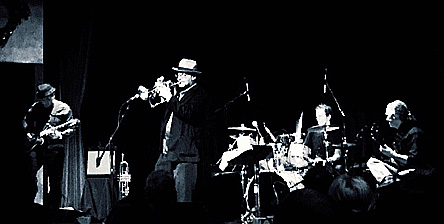 Jeff
Oster: Looping is basically the recording of sound on sound most
often on a live performance basis. It allows a musician to build harmonies
and tracks to play along with, without having multiple musicians needed
on stage to do so. Carl Weingarten is a master of this, and as the
years have gone by, technology has advanced to make this a very powerful
live performance medium.
Jeff
Oster: Looping is basically the recording of sound on sound most
often on a live performance basis. It allows a musician to build harmonies
and tracks to play along with, without having multiple musicians needed
on stage to do so. Carl Weingarten is a master of this, and as the
years have gone by, technology has advanced to make this a very powerful
live performance medium.
On Next I created the demos of every song on Apple's Garageband
software, along with some additional loops I had created for the project.
Once the demos were completed I then decided, along with my co-producers
Will Ackerman and Tom Eaton, which loops would be replaced by live
performances in the studio. Once those performances begin to happen,
we then shape the songs into what you eventually hear on the record.
mwe3: What made you choose to cover “I Can’t Make
You Love Me”? It’s such a classic. No guitars but some great
keyboard work from Tom Eaton and Philip Aaberg, who was one of the
original Windham Hill artists.
Jeff Oster: It is a classic song indeed, and one that has spoken
to me, and obviously many others, at a deep level for a very long
time. I knew I wanted to do a cover song, it just seemed like it was
time to do that, and this one was the one that I chose for my first
ever cover to be released on one of my albums. Feeling the song as
deeply as I do, it really helped the horn performance for me. I actually
recorded my horn part using a karaoke demo I found on YouTube as a
guide! Having worked with Phil Aaberg in the past, I wanted to hear
his performance on this piece, and it worked out beautifully. Tom
Eaton as well is a fine Fender Rhodes and Hammond B-3 player, and
you can certainly hear his excellence as well!
mwe3: Have you had the chance to bring your music to England
and other countries? Do you have plans to tour in the US or elsewhere?
I know you lived in South Florida, when was that? What do you like
best about living in the Bay Area besides the weather, the musicians
and the great Chinese food!
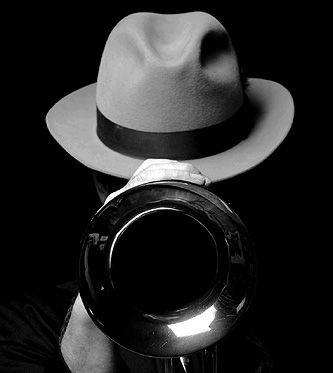 Jeff
Oster: Other than a trip to England and four other European countries,
playing with my high school concert band, I haven't been there to
tour. Actually, I do not tour very much, just select concerts from
time to time. I imagine as my kids grow older, I'll have a bit more
time to do that in "retirement". I lived in Miami from 1970-76,
and it was a great high school experience. Quite a unique environment,
including the 99% humidity in August!
Jeff
Oster: Other than a trip to England and four other European countries,
playing with my high school concert band, I haven't been there to
tour. Actually, I do not tour very much, just select concerts from
time to time. I imagine as my kids grow older, I'll have a bit more
time to do that in "retirement". I lived in Miami from 1970-76,
and it was a great high school experience. Quite a unique environment,
including the 99% humidity in August!
Living in the Bay Area is amazing, not cheap, but it's worth it in
exchange for the scenic beauty, No humidity or Mosquitos, great food
and both Big Sur and the Wine Country only a few hours away.
mwe3: Push comes to shove, your favorite 5 trumpet related
albums of yesterday and today and why?
Jeff Oster: Kind of Blue -Miles Davis, because it's
the Gold Standard
Pure Music -Bill Chase… inventive, exciting, high energy
brass!
Whipped Cream and other Delights -Herb Alpert - the album cover!
And the songs!
Children of Sanchez -Chuck Mangione .. fantastic arrangements
Snarky Puppy-Lingus (witness this!: http://youtu.be/L_XJ_s5IsQc)
mwe3: Would you say you’ve come a long way since playing
taps at a funeral for your first paid appearance? How would you say
you’ve evolved as a musician and are there other areas of writing
and recording that you’re planning in the future? I was reading
that Fiona Joy is planning something with you next year and she said
something about Carnegie Hall! That sounds amazing.
Jeff Oster: I played everything from taps at a funeral, to
weddings and bar mitzvahs, to working the customer line wearing a
Gumby hat at Magic Mountain in Southern California in 100° heat.
I believe that since I've been recording albums since 2003, that I
am just now coming into my own as a recording artist. The beauty of
music is that there is always more to learn, and you are never perfect,
you can only hope to capture moments of perfection hopefully while
tape is running! Yes, I said tape…
 And,
to bring it full circle, I just recorded on pianist Peter Jennison's
incredibly moving arrangement of “Taps” on his new album
Coming Home. Indeed, I am always looking to work with other
musicians. I’m playing on a very cool version of “Nature
Boy” on Catherine Marie Charlton’s new album Maiden’s
Voyage. Fiona and Lawrence Blatt and I have been talking about
a super group of sorts, in our genre, and one of the ideas is a performance
at Carnegie Hall. How cool would that be!
And,
to bring it full circle, I just recorded on pianist Peter Jennison's
incredibly moving arrangement of “Taps” on his new album
Coming Home. Indeed, I am always looking to work with other
musicians. I’m playing on a very cool version of “Nature
Boy” on Catherine Marie Charlton’s new album Maiden’s
Voyage. Fiona and Lawrence Blatt and I have been talking about
a super group of sorts, in our genre, and one of the ideas is a performance
at Carnegie Hall. How cool would that be!
Interview
pics (top to bottom)
Pic 1 - Jeff Oster at Will Ackerman's Imaginary Road Studios (photo
by Tom Eaton)
Pic 2 - Jeff and legendary bassist Chuck Rainey, at Jankland Recording
at the Jersey Shore (photo by Deborah Dorman)
Pic 3 - Mastering NEXT with Bob Ludwig at Gateway Mastering: Pictured
Left to right: Virginia Andrew (Will Ackerman's longtime assistant),
Bob Ludwig, Will Ackerman, Jeff Oster, Susan Ackerman and Tom Eaton
(co-producer and recording/mixing engineer)
Pic 4 - Nile Rodgers
Pic 5: Jeff Oster at Imaginary Road Studios - Windham County Vermont.
(Photo by Catherine Marie Charlton)
Pic 6 - Jeff with drummer Bernard "Pretty" Purdie, with
bassist Chuck Rainey holding court - the NEXT sessions at Jankland
Recording (photo Deborah Dorman)
Pic 7 - Photo by Craig Merrill - Oakland CA.
Pic 8 - Jeff and Will Ackerman - listening to the playback of "And
We Dance" (from NEXT) - at Gateway Mastering (photo by Tom Eaton)
Pic 9 - BLUE ETERNITY - live at Yoshi's Oakland, CA (with l-r Carl
Weingarten, Jeff Oster, Celso Alberti and Michael Manring)
Pic 10 - Photo from NEXT CD cover art
http://www.jeffoster.com
- Official Site
http://www.facebook.com/JeffOsterMusic
- Facebook Artist Page
http://www.youtube.com/ffejretso-
YouTube Channel
http://www.twitter.com/Jeff_Oster
- Twitter
http://www.reverbnation.com/rpk/289822
- Press Kit
http://www.reverbnation.com/jeffoster
- ReverbNation



